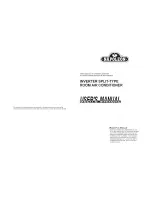
DC Inverter U-match Series Floor Ceiling Type Unit
22
(2). If the outdoor unit is installed higher
than the indoor unit
1). Taping should be done from lower to
the upper part.
2). All pipes are bound and taped together
and also should be trapped to prevent
water from returning to the room (See
Fig. 4.16).
3). Restraint all pipes to the wall with
saddles.
Fig. 4.16
5.4 Vacuum and Gas Leakage Inspection
CAUTION!
Do not purge the air with refrigerants but use a vacuum pump to vacuum the installation! There is
no extra refrigerant in the outdoor unit for air purging!
5.4.1 Vacuum
(1). Remove the caps of the liquid valve, gas valve and also the service port.
(2). Connect the hose at the low pressure side of the manifold valve assembly to
the service port of the unit’s gas valve, and meanwhile the gas and liquid
valves should be kept closed in case of refrigerant leak.
(3). Connect the hose used for evacuation to the vacuum pump.
(4). Open the switch at the lower pressure side of the manifold valve assembly
and start the vacuum pump. Meanwhile, the switch at the high pressure side
of the manifold valve assembly should be kept closed, otherwise evacuation
would fail.
(5). The evacuation duration depends on the unit’s capacity, generally, 20 minutes
for the 18K units, 30 minutes for the 24/36K units, 45 minutes for the 48/60K
units. And verify if the pressure gauge at the low pressure side of the manifold
valve assembly reads -1.0Mp (-75cmHg), if not, it indicates there is leak
somewhere. Then, close the switch fully and then stop the vacuum pump.
(6). Wait for some time to see if the system pressure can remain unchanged, 5
minutes for the 18/24K units, 10 minutes for the units more than 36K. During
this time, the reading of the pressure gauge at the low pressure side can not
be larger than 0.005Mp (0.38cmHg).
(7). Slightly open the liquid valve and let some refrigerant go to the connection
















































